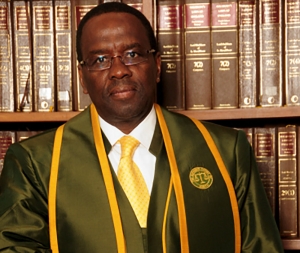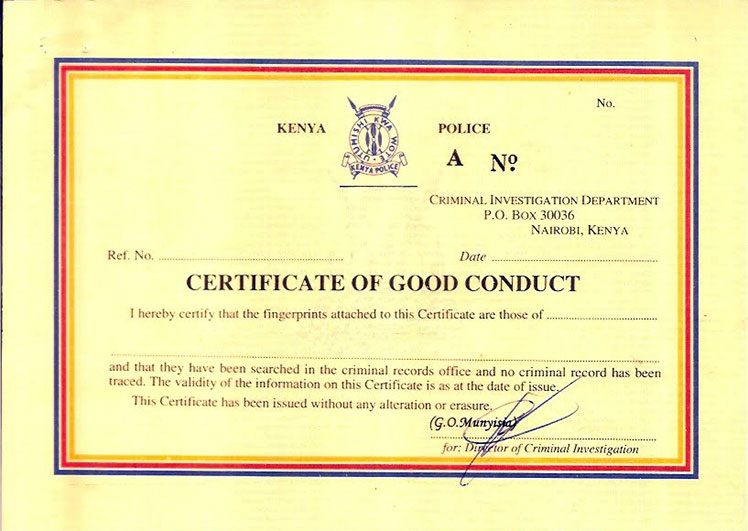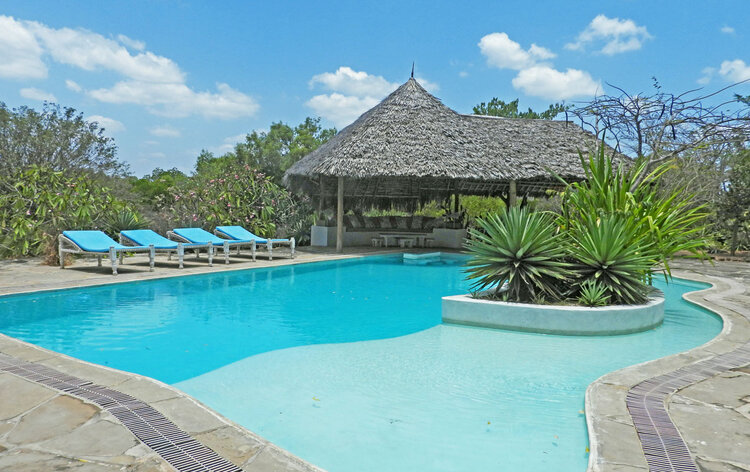It did, but I was not bothered by the lies people were spreading about it. I believe that many people talking about the stud had not read the history of our cultures which allowed men to wear them. I have fantastic sketches of these from various ethnic communities. It was not odd for my ancestors to command me to wear one for them. I was also supported by two great professors, both Muslim and Christian who contradicted the Christian and Muslim detractors of the stud.
The detractors were, in fact, questioning your sexuality.
Ultimately, truth is truth. I did not give a damn what people thought or believed. Yes, I had written articles in newspapers and scholarly journals in support of gay rights. Yes, I had funded organisations that support them. No, I'm not gay.
I believe humanity is not based on sexual orientation. Whether heterosexual or gay, we are all God's creations. I hate it when human beings play God. I really admire Archbishop Desmond Tutu when he says that he does not worship a homophobic God! Read his book, GOD IS NOT A CHRISTIAN.
When I became CJ, I became CJ of all Kenyans. Some of them are gay, and others are heterosexual. Some are thieves, murderers and arsonists, and others are great people. I swore an oath before God that I would serve all without fear or favour. This also meant that I would be guided by the Supreme Law, the Constitution, and not my personal beliefs. This is who I am and who I will continue to be. These are my truths, and my truths are not negotiable.
What led you to choose law as a profession?
My teachers. In the 60s, after independence, law was something smart guys did. My teachers said, "You are smart, go to the University of Dar es Salaam and read law". They talked about opportunities that lay ahead in terms of practice and judiciary. There weren't many African lawyers and competition was not stiff. Twenty students were selected from Kenya, Tanzania and Uganda respectively. I applied and got in.
At first, I regretted taking law, it is an unthinking profession. Lawyers call themselves learned, but we are very narrow in our discipline. We tend to shun other subjects that would enhance our knowledge. If you are a lawyer, you need to have knowledge of economics, history, biology, science, politics, psychology, theology, philosophy, sociology…everything we deal with on a day to day basis. Everything is not ruled by rules.
When you are dealing with people who have lost their land, are fighting over succession or have been hit by vehicles, how can you be effective that if you have no knowledge of counselling? Or empathy? We instead act like pathologists. A pathologist just cuts a dead body and says you died of heart attack, that's it. Lawyers tend to do the same things, and it's a great limitation. I regret not doing what I was particularly good at which was literature and history before getting into law.
It was only after I did my masters that I realised I hadn't made a big mistake after all. Because at this point, law was taught in the economic, historical, cultural and social contexts. I was now able to catch up and broaden my knowledge. That's why my practice has always been seen as activist- looking at law broadly and realising it can be used for good and evil. If you don't know that, you just stick to the rules, as if the rules exist in a vacuum.
And you went on to teach law?
I did. At the University of Nairobi, for eight years. Then I was fired and sent to prison.
Tell me about that.
In 1982, just before the coup détat, I was Secretary-General for the University Staff Union (USU). We were very active. The then President Moi didn't like it. The university was the only centre for dissent- everything else was pro-government. So they came for us. They disbanded the union, detained us and then after the coup they went after the students who were deemed radical. They locked them up, some died in prison.
When I came out of prison, I didn't have a job, but I had my practising certificate as an advocate. I started to practice, but it was difficult. Previous detainees were ostracised. People would not give us jobs because they feared what the Moi dictatorship would do to them.
I decided to open a lucrative business in criminal practice, defending bank robbers. Because I knew them from prison, so they started coming to me and recommending their friends. It was a bustling practice!
People were asking me why I was defending bank robbers? My rule was: I would defend them as long as there was no death in the robbery. But my answer was always, banks are robbers themselves. I used to tell lawyers who worked for banks, "You can't judge me, banks are exploiters". They just rob us legally- they take over peoples land and do all manner of terrible things. My clients were just small-time robbers. Tragically, all my clients were killed extrajudicially. So that was it, I closed shop and went to do my doctorate in Canada.
While I was there, I would check the papers every day and notice that the weapons that were recovered from robberies were all the same. Innocent guys were being framed, and no one was defending them.
That is how we started the Human Rights Movement - it was around 1991. The basis of the movement was constitution-making, multi partyism, activism, and bringing together political parties to field one candidate. In 2002, we succeeded. Mwai Kibaki won the elections.
You didn't become part of the new government when it was being formed, was this a deliberate choice?
Yes. When the Narc government was formed, I realised it was just going to be another dictatorship, so I decided not to work for them. I wanted to stay in activism but in a different capacity. I went to the Ford Foundation, where I could help activists by giving them grants to do their work. I also wanted to understand what foundations do. It was from the Ford foundation that I became Chief Justice.
Was becoming CJ something you had ever imagined for yourself?
When I applied, I never thought I would get it. I applied because I had fought for 40 years for that new Constitution; I thought if I sat in the supreme court for a while, I could contribute somehow in its implementation. And in changing the judiciary which I thought was very conservative, corrupt and ineffective. I used those five years to do something- I think we changed things.
Would you say your contribution to bringing a new constitution to life was your most significant professional achievement?
I don't look at it as an individual effort. Wherever I've worked, I've always been a part of a collective leadership. I think it's dangerous and vain to come out and say I achieved this or that when you just participated.
The Human Rights Movement was created by lots of people and civil society organisations. The notion of a movement is that you are part of a bigger thing where, as an individual, you are told, "Ok we think you can do ABC", and so you go ahead and do it. The credit belongs to whoever sent you there- collectively. I participated in the Human Rights Movement, constitution-making and the second liberation, and I would only add that my politics were always very different.
Meaning?
People tend to ruin movements by bringing in their ideological, political and intellectual positions in a dogmatic way. You think your views are dominant and not challengeable and in everything, you are the centre, bringing in your personal problems. That is very egocentric. People like that are difficult for movements because movements are painful. When your line of thought is rejected or subverted, you have to accept it- because it's not about you.
A movement is for and about many people. You must create consensus. I'm very unhappy with our politics, and that's why I spend time with young people discussing how we can change the Kenyan leadership. It must be changed. If you are going to keep this country as your motherland, and our generation has failed in this sense, then the only people who can do it are the youth. When I talk about my story, it's not about legacy but limitations, what didn't work and how going forward, we can rescue the weaknesses.

The honourable Dr Willy Mutunga served as Kenya's Chief Justice and President of the Supreme Court from 2011 to 2016
What is your definition of a great leader?
The best way for me to define it is to give examples from history. Why was Napoleon a great leader? Mao Zedong, Martin Luther King junior, Lenin, Malcolm X, Dedan Kimathi, Pio Gama Pinto, and even Kenyatta, Jaramogi Odinga, Tom Mboya were great leaders. What were the qualities that made them stand out?
You come to realise that the individual comes from the collective. There isn't one individual who sees everything, or who is so smart. When you look at Lenin's leadership, it was pegged on the issue of ideology. But he worked with great military generals and intellectuals. He also worked with artists and women who were specialists in gender issues.
Great leaders do not necessarily represent the greater good, and so this comes down to the qualities they possess on an individual level. Take the example of some of our leaders here in Kenya, we say they are all leaders, but many of them are pathological liars- they tell the truth by accident. It's a special breed of people, but we still call them leaders.
Our politicians are also very good at dividing us, that's their genius. They have found a way of getting us to believe that our entire community is in power because they are in power, even if the person believing this doesn't have food or a job. It's a sickness!
The question should really be, "Who is a good leader and who is a bad leader", because there is greatness, even in evil.
My definition is, therefore, one cannot be a great leader unless one is surrounded by other great leaders. He or she has to be part of a collective leadership for that greatness to be seen. Sadly, we have a culture that doesn't look at other people who were around these great leaders. But you will find women and men who actually did much more than that actual figurehead. And that is what I discovered in the judiciary. I worked with a great team of women and men, and all I did was make sure after we made a decision and because I had the judicial power, I had to follow through. I'm writing a memo where I glorify these people, so you get the idea that good leadership is collective and democratic, not authoritarian.
You speak your mind a lot, do you fear anything?
I lost that kind of fear when I went to prison. I realised that you have to defend your truth- speak your mind. Even if you get jailed or killed, it's a risk you have to take because we all die anyway.
I was detained because they said I used to give free legal aid to poor people. I was detained because they said I organised the staff at the university for subversive activities. They said I was fighting for academic freedom. Now, I wasn't, legally speaking, guilty of all those things, but I didn't think there was anything politically and constitutionally wrong with giving the poor legal advice, unionising people, or fighting for academic freedom. So I came out of detention saying, I'm not going to support any regime that denies me that space.
I could not be a teacher in the university and have someone telling me what to teach, and what not to teach, what to think, what not to think. That completely destroys my human dignity, and I have to stand up and fight for it. Whenever I see something happening in this country, my constant north is the national interest, the country. Where there is a war on corruption which is fraudulent, I say it as it is, because I see through it. I see this is not a war on corruption its intra-baronial conflicts around succession, that's what it is.
For us to be focused on a handshake for one year followed by individuals they want to decapitate for another year, when shall we talk about the issues that matter to young people? When are we going to talk about the national debt, quality education for our children, universal healthcare, housing? Never! Because they've put us in a trajectory that is always about divisions. They lull us with opium and crack cocaine seven days a week. Unless people understand how strong and clever these people are, they won't wake up. These people are not just a passing cloud, they are very well-grounded in terms of protecting their interests. We are so invested, and yet we don't have a dog in this fight. I truly believe that as a nation, once we start looking at issues, people won't care about tribes and what-not.
Poverty cuts across the Kambas, Luhyas and Kikuyus- it's everywhere you turn, and I hate it. At the end of every month, I go to a mobile money agent to send money to various relatives. When I'm there, I get very angry with our leaders. Why should I be paying fees for my nephews and nieces when there is a state that's supposed to do it. And even then, I as I send money on my mobile phone, I am being swindled because they are also taking 87 shillings for every transaction. I get very annoyed- we are being robbed blind with our eyes open, not blind, but open.
Is this why you once famously said, we are a bandit economy?
That's exactly what I think it is. People pick and run, they don't build. They get money and hide it abroad or build houses. They don't think of starting an industry here. Most of our rich are not industrialists.
The reason I say bandit is because bandits have no particular place where they stay, they go looting and causing havoc everywhere. Watch any of the cowboy movies and you will get the drift. The so-called Wild West was a banditry economy. The real bandits are the imperialists. Our bandits are simply agents.
Life is the constant and continuous struggle of who you want to be.What have you learnt about life?
Dr Willy Mutunga
If you want to talk about learning from life, it has to be in a trajectory. What you think of life when you are a child is very different from what you think of it when you are a teenager or adult, its a movement of sorts. If I reflect on what life was for me as a child- it was just an issue of being loved. Not necessarily by my parents alone but by the community. The humanity of the community is what life meant for me growing up, and it was good. I saw rich people helping poor people, there was the communal raising of children, sharing of resources. The fact that everybody was able to eat, and nobody died of hunger, there was some kind of equality.
When people talk about socialism, it's about basic needs because once you get food, water, an education and a job to do, your human dignity is whole. The fact is that the rich should not hurt the poor. My uncles were fairly well off, and I remember during Christmas, they would slaughter cows, and the entire village would eat. They knew who needed help in the village and they helped. I had a happy childhood in that sense. Until I got to school when I encountered very brutal teachers. The colonial education system was all about torture. Then religion came in with its own limitations because I could see the hypocrisy of it; as a child, you can always see it, it's not sophisticated. Your parents go to church on Sunday then at night, they are worshipping their ancestors. And so you wonder why did they go to church in the first place? They should just do what they think is good for them.
Then there's a time that life is about riches- the pressure of being "successful". You start working, and in a week, you hear so and so has bought a car. And then it's about competition, what people think of you, what you have. Life then becomes very seductive, and if you follow that path, it's hard to come back. That's how you see lawyers stealing from clients and the like.
So life is also the constant and continuous struggle of who you want to be. Even as CJ if you ask me what life was during that period, it was the struggle to resist the seduction of power.
How did you resist the seduction of power?
I had to be very conscious of it. If you don't make an attempt to resist it, you will lose yourself. I discovered this the day I was sworn in. I went to the judiciary, and there was a Mercedes and outriders with sirens waiting for my family and I.
We got into this convoy, and for the first time in my life, I was being driven by a policeman in full uniform. The entire town was at a standstill. I started feeling very happy with myself. I couldn't believe people could be stopped because the motorcade I was riding in had to pass. It's part of the ritual of making you feel special- like you now belong to a particular club that's exclusive.
As we drove, I felt yes, this is nice. Then I saw it for what it was. Because 10 years before, I'd been to Zimbabwe and we had been stopped because of Mugabe's motorcade. We were stopped an hour before the dictator was even out of his bed. And we couldn't move. I was supposed to go for a meeting just across the road, but I was grounded. After a while, we heard the sirens and many cars started to zoom by. There was this white man who was very angry about this, he looked at me and said, "There goes Bob and the wailers"- you know- from Bob Marley and the Wailers. I was very angry about this and fast-forwarded this experience to my current situation, I thought, maybe these people are feeling the same way with this motorcade. In that moment, I became very conscious of the seduction of power.
I arrived at State House, and everybody was there: Raila, Kibaki, Marende, Kalonzo…They all came to me as if was really the last piece of the puzzle, and everything is about me. Then I got out after I was sworn in and found there was now a new Mercedes Benz with the registration CJ 1 and eight bodyguards. I only had two when I went in. And now there was a flag on the bonnet of the Benz. I went to court to find journalists, national and international, waiting for me. That is the kind of life you sign up for, and if you want to avoid it, you make the decision from day one.
My real life is the life I lead as middle-class Kenyan. You might have a small car, a place to stay, eat well, educate and clothe your children and are paying off debts- for a lot of people that's all we need. And for me, this is the best life. You are not obligated to anybody. You have not stolen from anybody. This is what our vision of Kenya should be, a population that is 100% middle-class.You never got sucked into it all that time?
Dr Willy Mutunga
No. But I was always fighting it. I would be dishonest if I told you there wasn't progression and regression. I would go abroad and be received from the foot of the plane. At the door. I would be put in a limousine and driven to the VIP lounge. I wouldn't join the other mortals in the queues for security checks including taking off shoes and belts and so on (laughs).
The reason I mention this, I was in the US the other day, queuing at the airport and then all of a sudden I thought, some years back this wouldn't have happened (laughs). What I'm saying is that kind of life is not yours. Even if you are enjoying it, you only have a few years to do it. So you need to prepare yourself for that. It's a fast lane, even those who think they are billionaires today might become paupers tomorrow.
My real life is the life I lead as middle-class Kenyan. You might have a small car, a place to stay, eat well, educate and clothe your children and are paying off debts- for a lot of people that's all we need. And for me, this is the best life. You are not obligated to anybody. You have not stolen from anybody. This is what our vision of Kenya should be, a population that is 100% middle-class. If we are, we won't have anybody dying because they can't get to a hospital or, don't have food or lack access to education.
Who has had the most significant impact on your life?
My parents, my grandmother, my primary school teachers- in my memoir I talk about inspiring encounters and detail the people who left an indelible mark in my life.
I have also been impacted by several feminists, women like Micere Mugo, Wangari Maathai, Tazim Elkington… I continue to be inspired by many people, who are much younger than me. We talk about mentors and mentees but what a lot of people don't know is that mentees also mentors-it's a two-way street. If you ask me to be your mentor, I would say yes, so long as you can also be my mentor. Because there are a lot of things about young people that I don't know and would like to know. It's an amazing thing when you meet people and realise they are influencing you.
You mentioned the word feminism with pride, something few men are willing to do.
A lot of men- particularly chauvinists or patriarchs haven't challenged that comfort zone because patriarchy is a comfort zone- for any man. It's a social condition that benefits men, and so they enjoy privilege, they don't want to lose that. So when they hear feminism, when they hear equality, equity, gender parity, they hate the word. But it's from a place of failing to think.
I think that the men who hate feminism do so because of their wives, not because of their mothers, sisters, daughters…which man will not kill you if you touched his sister, his daughter, his mother? It's social conditioning that people have to resist, and for a lot of men, there's what's called feminist masculinity. You realise that women are your teachers about your weaknesses and they can make you a better person. So when a woman tells you you have to learn how to cook and clean or I can also drive you- you know, small things like that, they are helping you grow. This is before you even get to politics and economics where some people tell their wives who are professionals, "You can't work, I want you to be where I know I can control you". Why would any man who is decent not promote and support your profession? That's your life! I mean if you are a journalist and you can't write because somebody is telling you to stay at home and be a baby factory it's ridiculous!
Professor Micere Mugo opened me up to the idea of feminism. We were in the senior common-room, and she asked these professors what kinds of jobs they give to their maids and if they wash their underwear and make their beds- there was pandemonium, the men were totally outraged. I had just joined the university, and there was a strong culture of debate and education where you listened to people even if you didn't like what they said. I later asked her why she had asked that question when the answer was so obvious. She said, "I'm not going to answer your question, go and read these books", and she provided a list that introduced me to issues of gender equality.
I came to realise that it's our mothers who also raised us to be insensitive to women- in my time if my mother found me in the kitchen, I was beaten up.
A lot of people from your generation don't think like this, how did you acquire this mindset?
Education, including self-education. It has helped me develop a very reflective and critical mind. Education is so key for all these things. The University of Dar es Salaam opened up my mind about humanity and everything else, and then, as I interacted with people, I saw what works and what doesn't.
What are your thoughts on capitalism as an economic system?
I dislike capitalism, not because of its goods, but because of the distribution. Capitalism has excellent commodities: cars, clothes, wine, food, and so forth, but they are not distributed equitably.
The discussion should not be about people wearing western clothes, it should be one of inequality. So that if people have money to afford the luxury suits, they should have the consciousness that it's not right for some to be dressed and others to be naked. It's the notion of humanity, caring for others. We are not going to say everything from the West is bad- what about the machines we use? We don't manufacture them. We can only actually say we need to have our own so we don't depend on 'them' all the time. But if people like drinking whisky, I want them to drink the best, not the one that will make them sick (laughs).
More and more people are talking about the emergence of economic re-colonisation of Kenya- and Africa in general. What are your thoughts on this?
There is a real danger that we could lose Kenya to foreign interests. Now people are talking about the Chinese coming in, but they don't realise that the British never left. And the American, European, and Japanese interests are here, too. The Chinese leadership is particularly dangerous because their vision is one of offloading their people all over the globe, their system is corrupt, they support dictators.
They think legal colonialism is okay, where you get loans guaranteed by your ports and airports. Of course, they will argue their recolonization is better than the British who simply stole the land only to sell it back to us after 70 years. Foreign exploitation, domination and oppression from the West and East is here with us. I believe Mau Mau will come back- your generation will have to fight for its freedom the way my father's generation fought for theirs. We're going full circle.
Read full story on www.qazini.com→
━━━━━━━━━━━━━━━━━━━━━━━━ Qazini is a resource for anyone who is looking to improve their professional lives so they can raise their level of prosperity. We provide you with information that can help you on your journey to executing your dreams, we match employers with the right candidates for the job and job seekers with work that is the right fit for their skills.




